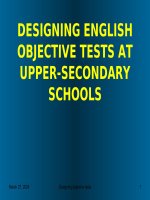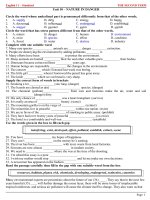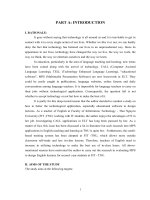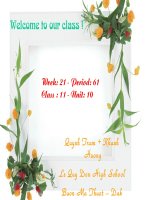Thiết kế bài dạy môn Tiếng Anh 11 - Unit 10: Nature in danger - Period: 62 teaching item: Reading
Bạn đang xem bản rút gọn của tài liệu. Xem và tải ngay bản đầy đủ của tài liệu tại đây (137.7 KB, 4 trang )
<span class='text_page_counter'>(1)</span>LESSON PLAN Unit 10 : NATURE IN DANGER Period : 62 Classes : 11 A2 , A3 Date of preparation : 25 / 01 / 2008 Date of teaching : 27 / 01 / 2008. Teaching item : READING I) AIMS AND OBJECTIVES . + LANGUAGE CONTENT : * To introduce students some new words relating to the topic : “Nature in danger”. * To provide students with some information about the fact that wild animals have become smaller . + LANGUAGE FUNCTION : * Talking about nature in danger and measures for protecting endangered nature. + EDUCATIONAL AIM : * To make students aware of the importance balanced ecosystem in nature. 1/ Languages : * Vocabulary : +pollutant (n) + decrease (n/v) + extinct (a) + interfere (v) + endangered (a) + cheetah (n) + pandas (n) + scatter (a) + remain (v) + offspring (n) + prohibit (v) + result in (v) * Structures: 2/ Skill : Scanning & Skimming 3/ Education factor : + To educate in students awareness of protecting the environment by not killing rare animals II) TEACHER AND STUDENTS' PREPARATION . 1/ Method : Communicative approach . 2/ Techniques : Chatting , Explanation, Translation, Synonym, Repetition, Ask-answer questions, Eliciting, Situation, Guessing meaning from the context , 3/ Materials needed : Lesson plan , Textbook , Color chalk , Handout , Pictures 4/ Students' preparation : * Read the guiding books and grammatical books before going to school . * Prepare new words for the reading and the keys for task 1,2 ,and 3 and exercise in the part of After you Read III) PROCEDURES IN CLASS . 1. Stabilization : (1 minute) * Greeting the students and asking them something about the attendance , their health, the weather and preparation. 2. Checking up the previous knowledge: (No checking) 3. Presentation of the new materials .. SPECIFIC STAGES TIME. TEACHER'S ACTIVITIES. 8ms. 1. Warmer * Dividing the class into four groups , thinking and going to B/B to write down the name of animals living in the forests in 5 minutes. The group. STUDENTS' ACTIVITIES * Dividing the class into four groups , thinking and going to B/B to write down the name of animals living in the forests Lop11.com. THE CONTENT OF THE LESSON Unit 10 : NATURE IN DANGER Period 62 : READING.
<span class='text_page_counter'>(2)</span> TIME. TEACHER'S ACTIVITIES. STUDENTS' ACTIVITIES. has more names of animals and the quickest win be the winner The suggested answers: 1. cheetah 2. tiger 3. panda 4. lion 5. elephant 6. deer 7. wild boar 8. monkey 9. wolf 10. giraffe 11. antelope 12. rabbit 13. squirrel 14. horse 15. zebra 16. goat 16. snake 18. python (traên) Lead-in: * Trying to answer questions * Introducing the text : + As you know there are a lot of animals living in the forests , but now the numbers of these animals have become smaller + Who can tell me why ? Today we are going to read a text about what people do to the nature * Writing the title of the lesson on B/B * Writing the title of the lesson down Unit 10 : NATURE IN DANGER Period 62 : READING 2. Pre reading: Pre-teaching vocabulary * Asking the students to work in groups to find out some new words and phrases 1. exist (v) [ig'zist] : tồn tại 2. have a great influence on (v) = affect 3. cut down trees (v) 4. pollutant [pə'lu:tənt] (n) chất gây. * Working in groups to find out some new words and phrases. * Asking the students to read the words above after the teacher in chorus. * New words 1. exist (v) [ig'zist] : tồn tại 2. have a great influence on (v) = affect 3. cut down trees (v) 4. pollutant [pə'lu:tənt] (n) 5. result in (v) 6. rare animal (n) 7. As a result (conj) 8. extinct [iks'tiηkt] (a). 5. result in (v) 6. rare animal (n) 7. As a result (conj) 8. extinct [iks'tiηkt] (a) tuyệt giống, tuyệt chủng 9. prohibit [prə'hibit] cấm; ngăn cấm ( to prohibit somebody / something from doing something) 10. interfere [,intə'fiə] can thiệp; xen vào; xía vào 11. human race : human being ['hju:mən'reis] : loài người, nhân loại. Unit 10 : NATURE IN DANGER Period 62 : READING. chất gây ô nhiễm. ô nhiễm. 8ms. THE CONTENT OF THE LESSON. * Reading the new words after the teacher in chorus. Lop11.com. tuyệt giống, tuyệt chủng 9. prohibit [prə'hibit] cấm; ngăn cấm ( to prohibit somebody / something from doing something) 10. interfere [,intə'fiə] can thiệp; xen vào; xía vào 11. human race : human being ['hju:mən'reis] : loài người, nhân loại.
<span class='text_page_counter'>(3)</span> TIME. TEACHER'S ACTIVITIES. STUDENTS' ACTIVITIES. THE CONTENT OF THE LESSON. 3. While reading: Activity 1: Task 1 (p.116). 5ms. Fill in the gaps * Asking the students to work individually to get the meaning of some words and then choose the most suitable word to complete the sentences * Calling on some students to give the answers. * Giving feedback on what students have. 1. extinct 3. decreasing 5. endangered. 6ms. 2. protect 4 .pollutants 6. interference. Activity 2: Task 3 : (Page 117) Answer the questions * Asking the students to read the passage again do this task in pairs * Calling one of them to give one questions and choose one of his/her friends to answer * Giving correct answers 1. Four ways that people are changing the world are: + They are changing the environment by building cities and villages. + They are affecting the water supply by using water for industry and agriculture + They are changing weather conditions by cutting down trees in the forests. + They are destroying the air by adding pollutants like smoke from factories and fumes from automobile motors 2. The serious consequences of people’s interference with the environment are: + many kinds of rare animals are killed + the environment where these animals are living is badly destroyed. + the numbers of rare animals are decreasing so rapidly that they are in danger of becoming extinct 3. Many things should be done to preserve endangered nature, such as: + Many organizations have been set up and money has been raised + Thousands of national parks have been established + Laws have been passed to prohibit. Task 1 (page 116) * Working individually to get the meaning of some words and then choose the most suitable word to complete the sentences * Some students give the answers.. Fill in the gaps 1. extinct 2. protect 3. decreasing 4 .pollutants 5. endangered 6. interference. Task 3 : (Page 117). Answer the questions * Reading the passage again Answer keys: and doing this task in pairs 1. Four ways that people * Some students give questions are changing the world are: and others answer They are : + changing the environment by building cities and villages. + affecting the water supply by using water for industry and agriculture + changing weather conditions by cutting down trees in the forests. + destroying the air by adding pollutants like smoke from factories and fumes from automobile motors 2. The serious consequences of people’s interference with the environment are: + many kinds of rare animals are killed + the environment where these animals are living is badly destroyed. + the numbers of rare animals are decreasing so rapidly that they are in danger of becoming extinct 3. Many things should be done to preserve endangered nature, such as: + Many organizations have been set up and money has Lop11.com.
<span class='text_page_counter'>(4)</span> TIME. TEACHER'S ACTIVITIES. STUDENTS' ACTIVITIES. killing endangered animals. 5ms. Activity 3: Task 2 : (Page 117) Circle A, B, C, or D that best sum up each paragraph * Asking the students to work in pairs again and find the best sum up * Calling some students to give their ideas * Giving correct answers 1. C 2. B 3. A 4. C. THE CONTENT OF THE LESSON been raised + Thousands of national parks have been established + Laws have been passed to prohibit killing endangered animals .. * Working in pairs again and finding the best sum up * Some students give their ideas. Task 2 : (Page 117) Circle A, B, C, or D that best sum up each paragraph Answer keys: 1. C 2. B 3. A 4. C. 4. Post- reading:. * Speak-it-up. 10ms. 2ms. Asking the students to work in groups * Students work in groups to to have a discussion about how some discuss how some animals have animals have become extinct become extinct HOMEWORK: * Asking the students to write down the homework + Prepare SPEAKING + Learn the new words from the reading by heart.. * Writing down the homework. HOMEWORK: + Prepare SPEAKING + Learn the new words from the reading by heart.. Self-evaluation: …………………………………………………………………………………………………………………………………………………………………………………………………………………………………… …………………………………………………………………………………………………………………………………………………………………………………………………………………………………… …………………………………………………………………………………………………………………………………………………………………………………………………………………………………… …………………………………………………………………………………………………………………………………………………………………………………………………………………………………… …………………………………………………………………………………………………………………………………………………………………………………………………………………………………… ………………………………………………………………………………………………………………………………………………………………………………………………………………………………... Lop11.com.
<span class='text_page_counter'>(5)</span>









